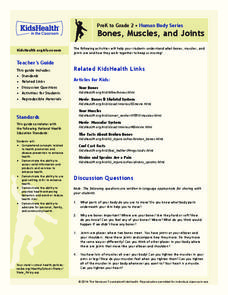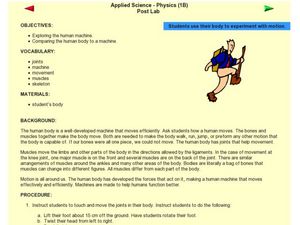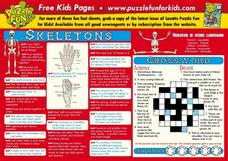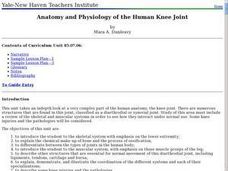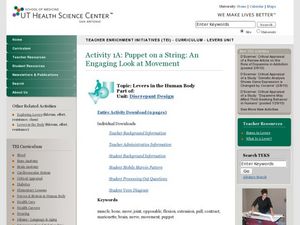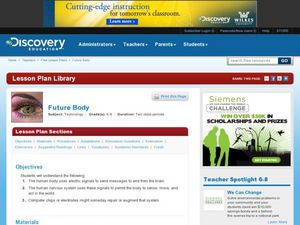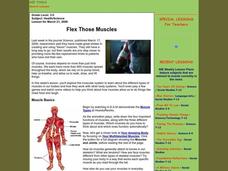Curated OER
Levers and Wedges in the Human Body
Young biologists identify parts of the body that serve as wedges (teeth and fingernails), and as levers (jaw, arms, and legs). The hands-on activities described here should be exciting for learners to perform, and should also lead to a...
Curated OER
Human Body Lessons
Students read "The Magic School Bus in the Human Body" and discuss the importance of maintaining a healthy body. They create a hinge and joint paper skeleton, follow the journey of a hamburger through the digestive tract, jump rope and...
Nemours KidsHealth
Bones, Muscles, and Joints
What is the hip bone connected to? Learn about body parts and the human skeleton with a game of Simon Says, skeleton puzzle, and five question quiz.
Rochester Institute of Technology
Biomechanical Joint
Discuss mechanical advantage and how the human body moves/works. Learners focus on bioengineering, working together to build a functioning mechanical arm. Additionally, they analyze an air muscle, discussing its appropriate use in...
Curated OER
Human Machine
Students explore the human body by conducting an exercise in class. In this human anatomy lesson plan, students view a diagram of the human body and identify the specific bones and joints that allow us to perform specific exercises like...
Curated OER
Human Anatomy- How Do We Move?
Students examine the muscular system. In this muscular system instructional activity, students first draw a realistic representation of their leg or arm bones. Students do several activities to attach these bones to "joints" with...
Curated OER
Skeletons
In this science worksheet, students investigate the human skeletal system. Students read factual paragraphs with details about the bones in the human body and in some other species as well. Students complete a crossword puzzle.
Curated OER
Joints Help Us Move
Third graders investigate the three main types of joints in their arms and legs that are in charge of movement. In this human biology lesson, 3rd graders view x-rays online to see how different joints look, participate in exercises...
Curated OER
Life Science: Exploring Our Human Bodies
Students explore the concept of the human body. They complete a variety of activities concerning the function of various organs. They listen to their heartbeat with a stethoscope, examine how muscles work during a game of tag, and play...
Curated OER
Skeleton
Students study the skeleton. In this human body lesson, students draw and label bones in the body by tracing each other and creating a skeleton out of body parts and brass fastners.
Curated OER
Anatomy and Physiology of the Human Knee Joint
Students examine human anatomy with a focus on the knee joint. In groups, they research the chemical makeup of human bones and explain the different types of joints found in the body. To end the lesson, they identify the other structures...
Curated OER
Levers in the Body: They Are Not What You Might Think!
Students investigate lever systems in the human body and compare arm anatomy to model. In this human levers activity students graph and analyze their results.
Curated OER
The Magic School Bus Flexes Its Muscles
Students learn along with Ms. Frizzle's class. In this Magic School Bus lesson plan, students explore the inside of the human body as they compare the bones and joints of a chicken wing with their own hands and arms.
Curated OER
Human Anatomy
Students use the web to explain how the bones serve as protection for organs in the body and recognize some of the bone structure that protect certain organs. They comprehend the different structure and functions of support tissue...
Curated OER
Head, Shoulders, Knees and Toes
Students gain a greater comprehension of the anatomy and physiology of the muscular system, the skeletal system and connective tissue by researching joints in the body. They also reflect on the effects of injuries on their joints and...
Curated OER
Skin: Skin Prints
Learners explore human anatomy by participating in a print experiment. In this human skin instructional activity, students define the term "epidermis" and utilize computer paper, pencils, tape and baby wipes to create a print of their...
Curated OER
The Skeletal System
Young scholars research the skeletal system. In this anatomy lesson, students measure their bodies to find the approximate length of their bones. They draw and cut out each of the bones and then attach them using brads or glue.
Curated OER
Puppet on a String: An Engaging Look at Movement
Pupils examine how muscles can work together with joints. In this movement lesson students use a marionette to observe how muscles work.
Common Sense Press
What is the Skeletal System?
Students investigate the human skeletal system. In this biology lesson, students trace the outline of their body onto butcher paper and fill in the names of the bones. Students use an overhead transparency of the human skeletal system to...
Curated OER
Future Body
Young scholars explain the benefits of cyborg augmentation. In this technology lesson plan, students research how the nervous system works. They create posters and present them to class.
Curated OER
Bones, Bones, and More Bones
Young scholars describe the functions of bones in the human body. They describe the make up of a bone. They engage in a series of wonderful hands-on activitiies that reinforce learning of bones and the skeletal system.
Curated OER
Flex Those Muscles
Students explore the muscular system to examine the different types of muscles in our bodies and how they work with other body systems. They discover how muscles help us chew food and laugh. Videos are used as part of this lesson.
Curated OER
Muscular and Skeletal Systems
How do muscles move bones? Find out using a built-in-class model. Pupils construct a hand model with paper and string, then follow a series of directions to explore the movement process. Discover additional information about the muscular...


